

Land Grab Cheats North Dakota Tribes Out of $1 Billion, Suits Allege. But that last-resort land turns out to hold a wealth of oil, because it sits on the Bakken Shale, widely believed to be one of the world's largest deposits of crude.
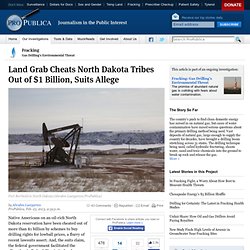
Until recently, that oil was difficult to extract, but hydraulic fracturing, combined with the ability to drill a well sideways underground, can tap it. The result, according to several senior tribal members and lawsuits filed last November and early this year in federal and state courts, has been a land grab involving everyone from tribal leaders accused of enriching themselves at the expense of their people, to oil speculators, to a New York hedge fund, to the federal government's Bureau of Indian Affairs. Message from Mexico: U.S. Is Polluting Water It May Someday Need to Drink. Mexico City is planning to draw drinking water from a mile-deep aquifer, challenging U.S. policy that water far underground can be intentionally polluted because it will never be used.
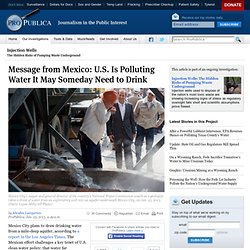
Mexico City's mayor and general director of the country's National Water Commission watch as a geologist takes a drink of water from an exploratory well into an aquifer underneath Mexico City, on Jan. 23, 2013. (Dario Lopez-Mills/AP Photo) Mexico City plans to draw drinking water from a mile-deep aquifer, according to a report in the Los Angeles Times [1]. The Mexican effort challenges a key tenet of U.S. clean water policy: that water far underground can be intentionally polluted because it will never be used.
U.S. environmental regulators have long assumed that reservoirs located thousands of feet underground will be too expensive to tap. Wabasha council vote today on silica sand transport facility. The Wabasha Planning Board will decide Friday whether to allow Calgary-based Superior Sand Systems to build a sand transport facility in town.
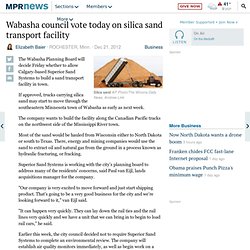
If approved, trucks carrying silica sand may start to move through the southeastern Minnesota town of Wabasha as early as next week. The company wants to build the facility along the Canadian Pacific tracks on the northwest side of the Mississippi River town. Most of the sand would be hauled from Wisconsin either to North Dakota or south to Texas. There, energy and mining companies would use the sand to extract oil and natural gas from the ground in a process known as hydraulic fracturing, or fracking. Superior Sand Systems is working with the city's planning board to address many of the residents' concerns, said Paul van Eijl, lands acquisitions manager for the company.
"Our company is very excited to move forward and just start shipping product. "It can happen very quickly. Poisoning the Well: How the Feds Let Industry Pollute the Nation’s Underground Water Supply. A view of the dry bed of the E.V. Spence Reservoir in Robert Lee, Texas, in October 2011. Records show that environmental officials have granted more than 50 aquifer exemptions for waste disposal and uranium mining in the drought-stricken state. (Calle Richmond/Reuters) EPA records show that portions of at least 100 drinking water aquifers have been written off because exemptions have allowed them to be used as dumping grounds.
"You are sacrificing these aquifers," said Mark Williams, a hydrologist at the University of Colorado and a member of a National Science Foundation team studying the effects of energy development on the environment. As part of an investigation into the threat to water supplies [1] from underground injection of waste, ProPublica set out to identify which aquifers have been polluted. We found the EPA has not even kept track of exactly how many exemptions it has issued, where they are, or whom they might affect.
Water Contamination Fracking/better than coal. Frack Water. WPRNews.org. New Study: Fluids From Marcellus Shale Likely Seeping Into PA Drinking Water. Researchers show natural fluids are migrating from thousands of feet underground and reaching drinking water supplies, raising concerns that man-made chemicals and waste could do the same.
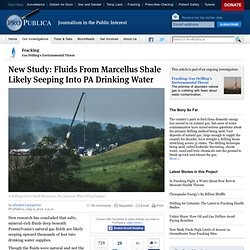
A drilling site in South Montrose, Pa. (Spencer Platt/Getty Images) New research has concluded that salty, mineral-rich fluids deep beneath Pennsylvania's natural gas fields are likely seeping upward thousands of feet into drinking water supplies. Though the fluids were natural and not the byproduct of drilling or hydraulic fracturing, the finding further stokes the red-hot controversy over fracking in the Marcellus Shale, suggesting that drilling waste and chemicals could migrate in ways previously thought to be impossible. The study, conducted by scientists at Duke University and California State Polytechnic University at Pomona and released today in the Proceedings of the National Academy of Sciences [1], tested drinking water wells and aquifers across Northeastern Pennsylvania. Home rule goes up against the fracking industry - and the political system.
The fight against fracking in Ohio comes at a time when the state is approving new wells at a rapid pace.
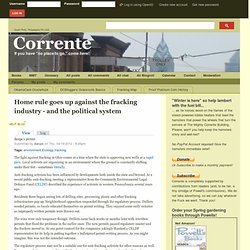
Local activists are organizing in an environment where the ground is constantly shifting under their feet - sometimes literally. Anti-fracking activism has been influenced by developments both inside the state and beyond. At a recent public anti-fracking meeting a representative from the Community Environmental Legal Defense Fund (CELDF) described the experience of activists in western Pennsylvania several years ago. Residents there began seeing lots of drilling sites, processing plants and other fracking infrastructure pop up. Neighborhood opposition responded through the regulatory process.
The wins were only temporary though.